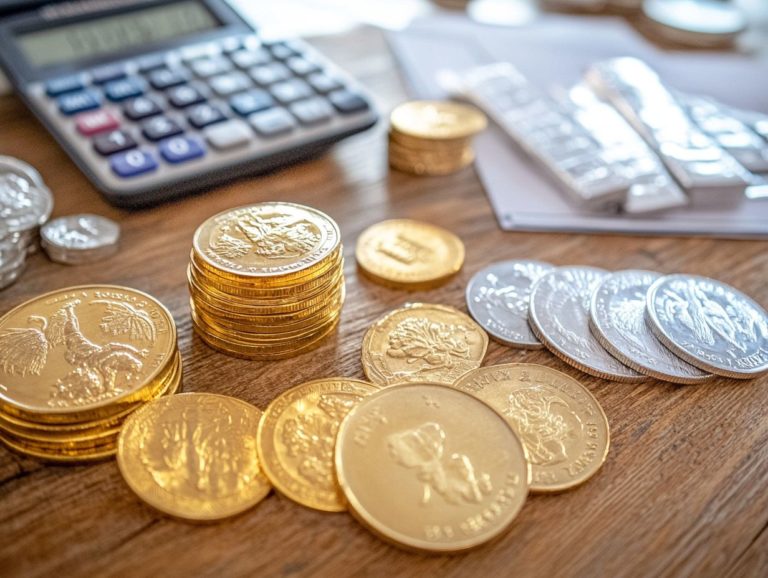How to Prepare for Potential Tax Changes in Precious Metals
As the landscape of taxation evolves, you may find yourself facing new challenges and opportunities in your precious metals investments.
This article delves into the proposed tax changes that could significantly impact your portfolio, offering valuable insights into how these shifts might reshape your financial landscape.
Discover effective strategies for navigating this dynamic environment, from diversifying your assets to seeking expert guidance.
We’ll also explore other critical factors, such as timing and market trends, to empower you in making informed decisions.
Act now to protect your investments with our must-read guide!
Contents
- Key Takeaways:
- Understanding Potential Tax Changes
- Implications for Precious Metals Investors
- Strategies for Preparing for Tax Changes
- Key Factors to Boost Your Investment Success
- Frequently Asked Questions
- Curious about upcoming tax changes in precious metals?
- Why should I prepare for potential tax changes in precious metals?
- How can I stay updated on potential tax changes in precious metals?
- What steps can I take to prepare for potential tax changes in precious metals?
- Will potential tax changes in precious metals affect my tax liability?
- What can I do if potential tax changes in precious metals are implemented?
Key Takeaways:

- Spread out your investments to reduce the impact of any tax changes on precious metals.
- Get expert advice to navigate tax changes effectively!
- Consider market trends and the timing of investments to make informed decisions in light of potential tax changes.
Understanding Potential Tax Changes
Grasping the nuances of potential tax changes is essential for you as an investor, particularly if you’re involved in precious metal investments like gold, silver, and platinum.
Shifts in tax laws can carry significant implications that impact tax on profits from selling investments, estate planning, and your overall investment strategy.
By staying well-informed about federal and state tax policies, as well as updates from the IRS, you can adeptly navigate your tax obligations to sidestep costly financial penalties.
It’s prudent to consult a tax professional; they can clarify reporting requirements and help you ensure compliance with the ever-evolving landscape of tax regulations.
What Changes are Being Proposed?
Proposed changes in tax policies by the IRS could have a significant impact on you as an investor, especially if your portfolio includes precious metals like gold and silver.
These adjustments aim to foster a more equitable tax system, which might result in higher taxes on profits for affluent investors while potentially offering relief for those in lower-income brackets.
For instance, if you’re a middle-income family investing in gold, you could see reduced tax rates, making precious metals more accessible than ever.
On the flip side, wealthier individuals, particularly those with extensive portfolios of precious metals and stocks, may encounter higher taxes on profits that could change how they manage their investments.
A recent case study highlighted a family who restructured their portfolio in response to these changes, showcasing how they adapted their investment choices to maximize benefits while minimizing tax burdens.
Implications for Precious Metals Investors
Investing in precious metals like gold, silver, and platinum is heavily influenced by capital gains tax.
This makes it crucial to adopt a well-informed strategy to ensure compliance and maximize your returns.
It’s important to consider how potential tax changes might impact your investment portfolio, as shifts in tax laws can significantly affect the net gains you realize upon selling.
Engaging with a tax professional is essential for navigating these complexities and crafting effective strategies to minimize your tax liabilities.
How Will Taxes Impact Investments?

Taxes wield considerable influence over your investments, particularly through capital gains tax, which can pose significant financial penalties if not managed effectively.
For those investing in precious metals, grasping the intricacies of capital gains tax is essential, as it can dramatically impact your overall returns.
When these assets appreciate in value and you decide to sell, the tax on your profits can be quite substantial.
This is why keeping meticulous records of your purchases, sales, and any related expenditures is vital for complying with IRS reporting requirements.
You can also take advantage of strategies like tax-loss harvesting, which involves selling underperforming investments to offset your gains.
This tactic not only helps minimize your tax liabilities but also enhances your overall investment strategy, providing you with greater financial flexibility.
If you haven t consulted with a tax professional yet, now is the time to do so!
Strategies for Preparing for Tax Changes
Preparing for potential tax changes demands strategic planning and a keen understanding of how to adapt your investment strategies to mitigate tax implications.
By utilizing tax-advantaged accounts like Roth IRAs, Health Savings Accounts, and Coverdell ESAs, you can maximize your returns while minimizing tax obligations.
Tax-loss harvesting is also an effective strategy, which involves selling investments that have lost value to reduce tax on gains from other sales. This highlights the importance of maintaining detailed records to support any claims you may make.
Diversifying Your Portfolio
Diversifying your investment portfolio is essential for mitigating risks, especially as tax implications surrounding precious metal investments continue to evolve.
By weaving together a tapestry of asset classes such as equities, bonds, and real estate you can enhance tax efficiency while reducing exposure to capital gains tax.
For instance, equities often present opportunities for long-term growth and may come with favorable tax benefits due to lower rates for long-term holdings. Bonds offer stable income streams and tend to be less volatile than precious metals.
Incorporating real estate into your portfolio adds another layer of diversification and allows you to take advantage of depreciation deductions, which can reduce your taxable income based on the declining value of property. This strategic approach provides a buffer against tax burdens from other investments.
Seeking Professional Advice
Consulting a tax professional or financial advisor is essential for navigating the complexities of tax policies and ensuring compliance with current laws that impact your investments.
These experts bring a wealth of knowledge about tax implications, allowing you to make informed financial decisions. They can develop tailored strategies designed to minimize tax burdens while aligning with your overall financial goals.
This personalized approach considers your individual risk tolerance, investment timelines, and financial objectives. It ensures that every decision enhances your growth potential while protecting your assets from unforeseen liabilities.
By seeking professional guidance, you can stay informed about relevant changes in legislation, paving the way for a stronger financial future!
Key Factors to Boost Your Investment Success

Beyond grasping the nuances of tax implications, consider critical factors like market value and the timing of your investments. These elements play a pivotal role in crafting effective investment strategies, especially for those venturing into precious metals.
Timing of Investments
The timing of your investments significantly impacts your capital gains tax liabilities. It’s essential to strategically plan your entry and exit points.
By making wise timing decisions, you can minimize tax obligations and enhance overall returns. For example, consider the tech sector’s market fluctuations during the late 1990s and early 2000s. Savvy investors sold during peaks, effectively lowering their capital gains tax rates by holding onto their assets for over a year.
Understanding seasonal trends, like typical year-end sell-offs or mid-year surges, can provide valuable insight into when to realize profits. By analyzing these patterns, you can craft a comprehensive tax strategy that aligns seamlessly with your financial goals.
Start planning now for potential tax changes to secure your financial future!
Market Trends and Predictions
Keeping a close eye on market trends and predictions is essential for crafting investment strategies that consider the tax implications linked to precious metals.
You can significantly enhance your returns by understanding how fluctuations in demand, economic indicators, and geopolitical events influence the market. For example, during periods of economic uncertainty, precious metals such as gold and silver often experience a surge in demand, leading to rising prices. Additionally, it’s important to consider gold’s tax implications when investing.
It’s crucial to recognize that while these gains can be substantial, they may also come with tax obligations, as capital gains taxes, which are taxes on the profit from the sale of assets, could apply when you decide to liquidate these investments. To navigate these complexities, learn how to prepare for changes in precious metals tax laws. Be ready to adapt your strategies according to market changes; this can protect your investments and optimize your post-tax returns, ensuring you maximize your financial outcomes.
Final Thoughts and Recommendations
Understanding various investment strategies and their corresponding tax obligations enables you to understand the challenges of precious metal investments while avoiding financial penalties.
By being proactive in your tax planning, you can identify potential pitfalls and seize opportunities that arise from your investment choices. Understanding the impact of global tax policies on precious metals investing can further enhance your approach. Collaborating with a knowledgeable tax professional provides tailored insights and strategies that cater to your unique financial situation.
This partnership not only deepens your understanding of tax liabilities but also gives you the power to make informed decisions that align with your long-term goals. Ultimately, a well-structured approach to tax matters, including tax reporting for precious metals investments, ensures that you can fully realize the benefits of your precious metal investments without the burden of unexpected tax liabilities looming overhead.
Frequently Asked Questions

Curious about upcoming tax changes in precious metals?
Potential tax changes in precious metals refer to adjustments or modifications made by the government to the tax laws and regulations surrounding the buying, selling, and ownership of precious metals.
Why should I prepare for potential tax changes in precious metals?
As a precious metals investor, stay ahead of the game by keeping yourself in the loop about potential tax changes, as they can significantly impact the value and profitability of your investments.
How can I stay updated on potential tax changes in precious metals?
You can stay updated on potential tax changes in precious metals by regularly following financial news and updates, consulting with a trusted financial advisor, and staying informed about any proposed tax legislation.
What steps can I take to prepare for potential tax changes in precious metals?
To prepare for potential tax changes in precious metals, diversify your portfolio, keep accurate records of your transactions, and educate yourself on the current tax laws and regulations.
Will potential tax changes in precious metals affect my tax liability?
Yes, potential tax changes in precious metals can affect your tax liability. It is important to understand the tax implications of your investments and plan accordingly to minimize your tax burden.
What can I do if potential tax changes in precious metals are implemented?
If potential tax changes in precious metals are implemented, you may need to adjust your investment strategy and consult with a financial advisor to minimize the impact on your portfolio.













